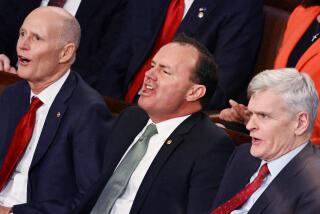Hike in Medicare Eligibility Age Is Urged : Legislation: Chairman of a House health subcommittee says the program should match rise in Social Security benefits to 67 from 65.
- Share via
WASHINGTON — An influential congressional chairman said Monday that Medicare’s age of eligibility should be raised to 67 from 65 in the next century to assure the future solvency of the massive federal health care program.
“It does not make sense” for Medicare to be out of step with Social Security, said Rep. Bill Thomas (R-Bakersfield), chairman of the House Ways and Means health subcommittee. The age at which a retiree may receive full Social Security benefits, now 65, will be increased gradually starting in the year 2000, and will reach age 67 in the year 2027.
The nation must face the demographic reality of the huge baby boom generation and raise the eligibility age for Medicare or face a massive financial crisis for future taxpayers, Thomas said in a speech to the Heritage Foundation, a conservative Washington policy organization.
This is not necessarily an issue for the current Congress, but something the country must grapple with in anticipation of the vast numbers of future retirees, Thomas said.
For the immediate Medicare challenge--the predicted bankruptcy of the hospital trust fund in 2002--Thomas said that his subcommittee will design a plan in the coming weeks to radically restructure the program and slow its “outrageous” 10% annual increase in spending.
Thomas warned of the need for financial sacrifices by the 36 million Medicare beneficiaries as well as the doctors and hospitals serving them. This likely will mean higher co-payments and deductibles by the beneficiaries and further restraints on payments to doctors and hospitals, he indicated.
Thomas also said that he wants to bring into the Medicare tax rolls the 3 million state and local employees who now are exempted. The Medicare payroll tax is levied on all wages, with workers and employers each paying 1.45%.
The subcommittee chairman declined to provide any details of the plan under development, admitting that the “difficult part” for his subcommittee will be crafting a plan that can win a majority in the House.
An estimated $250 billion to $300 billion over seven years, either in revenues or savings, is needed to restore fiscal solvency to the Medicare trust fund, according to the projections.
But Thomas and his fellow Republicans have rejected tax increases as a solution to the fiscal gap. “It makes no sense at all to put on the backs of employers increased taxes,” he said.
Republicans have said that the short-term Medicare crisis can be managed by slowing the program’s future growth rate from 10% a year to 7%, with the program spending $1.1 trillion over the next seven years, instead of the $1.4 trillion now projected. But Democratic opponents, supported by senior advocacy groups, doctors and hospitals, have said that the changes would harm both the availability and quality of care.
“One of the most annoying things is the role of groups representing seniors,” Thomas said of the rising drumbeat of opposition from older Americans. Seniors “aren’t getting a good package for the money” they put into Medicare, Thomas said. Their contributions include their co-payments, personal spending for things not covered by Medicare and supplementary health insurance.
“We’ve got to create a way for beneficiaries to get a better deal,” Thomas said.
He said that he believes the solution lies in managed care. The government could give Medicare enrollees a wide range of health plan choices, including health maintenance organizations and other networks of doctors and hospitals.
Beneficiaries could remain in the current Medicare system, which allows them to select any doctor or hospital. But Thomas said that he thinks large numbers of Medicare beneficiaries would appreciate being able to choose among several health plans that offer things Medicare does not, such as coverage for prescriptions or the elimination of co-payments and deductibles.
More to Read
Get the L.A. Times Politics newsletter
Deeply reported insights into legislation, politics and policy from Sacramento, Washington and beyond. In your inbox twice per week.
You may occasionally receive promotional content from the Los Angeles Times.










